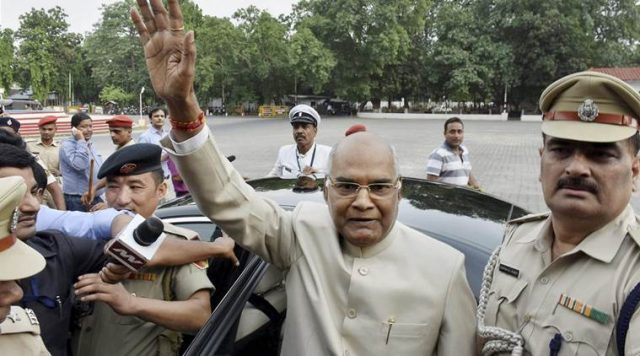
“Maine jaise swayam safalta paayi, vaise tum log bhi mehnat karo (Just like I achieved success on my own, you should work hard for it too)”. These words of Ram Nath Kovind, the NDA’s nominee for president, to his nephew, quoted in a report in The Indian Express, aptly sum up the man in question. Kovind, besides many other things, is self-made.
From a humble village, Paraukh near Kanpur, to Parliament and Supreme Court in Delhi to Raj Bhavan in Patna, Kovind’s journey has been that of a committed and dedicated party activist and social worker. He joined the RSS and Jana Sangh and later graduated into an active leader of the BJP in Uttar Pradesh.
Kovind is a lawyer by training. He served as the government’s standing counsel for more than a decade in the Supreme Court. Having cleared the civil services exams, he opted out when he couldn’t get into the coveted IAS cadre and was offered the allied services instead. He became a Rajya Sabha MP in 1994 and remained in the House for two terms until 2006. During his tenure in the Rajya Sabha he had the rare distinction of addressing the United Nations as a member of the Indian delegation in October 2002. Colleagues in Parliament remember him as a gentle, soft-spoken and yet a focused person. He served in the BJP in several capacities as the president of the SC Morcha and party spokesman.
In a caste-obsessed polity, Kovind’s caste identity becomes an important debating issue with some reducing it to the BJP’s “political outreach” while some others see it as a political “masterstroke”. Kovind’s identity as a Dalit is certainly a matter of fact. He belongs to a lower middle class family of farmers. His rise to become a nominee for the post of the first citizen of India is a tribute to the power of our value system and democracy.
Dalit aspirations in our country need newer representation and leaders like Kovind represent that new leadership. They represent the new age Dalit thinking centred on developmental activism of an empowered community. Seeing their social identity as integral to the larger national identity is the hallmark of this newly empowered Dalit leadership. This integrationist thinking is the product of the long years that leaders like Kovind have spent in imbibing the One Nation One People ideology of the BJP and its parivar.
But to limit the discourse to Kovind’s caste identity alone will be a great injustice not only to the man but also to the political maturity of our nation. Kovind is not going to be the first or last Dalit to occupy the 340-room red sandstone building of the British era called the Rashtrapati Bhavan. K.R. Narayanan occupied that palatial building for five years from 1997 to 2002. Like Narayanan, Kovind also is a well-read and accomplished leader.
Comparisons that are being made about the nominee and some former presidents are unfair and uncalled for. The office of president has largely been non-controversial in all these decades barring a couple of unsavoury episodes. Given his nature and temperament, Kovind is expected to fit smoothly into the job. The vast exposure to global politics that he acquired through travels to more than a dozen countries as part of the parliamentary delegations would also come in handy for him, as the president is also expected to receive global leaders.
Returning to Narayanan, it is important to recall what had happened in 2000 when he visited Paris. “An untouchable in Elysees” is how the French media had chosen to report the state visit of the Indian President. Le Monde was the only French newspaper to be given an interview by President Narayanan, and it again headlined the interview with his caste.
The Indian side, including the president himself, was thoroughly shaken and embarrassed by this outrageous portrayal of Narayanan’s humble beginnings in a most tactless and mocking way by the French media. The French establishment was forced to issue regrets and an apology.
The rise of K.R. Narayanan and Ram Nath Kovind to the highest position in India should be a matter of pride both for their personal identity as well as the nation’s collective will. When Dr Zakir Hussain became Vice President of India some enthusiasts had gone up to him to congratulate him. “A Muslim like Hussain becoming the Vice President of India shows how successful our secularism is”, they said. Dr Hussain reprimanded them saying “the true success of secularism is when a Muslim becomes the Vice President of India and yet nobody comes to congratulate him as a Muslim, and people see him only as an Indian.”
“Our politics is groupish, not selfish”, laments renowned social psychologist Jonathan Haidt in The Righteous Mind. Group identities become important and defining. That leads to stereotypes and, eventually, to more divisions. We end up making great national figures into small group leaders. As a consequence, the loss is to the entire nation, as we have already seen in the case of Narayanan.
If at all Kovind represents any section, it is that of the majority of India — rural, agrarian, economically and socially underprivileged. It is the same section that Prime Minister Narendra Modi represents. He too was sneered at by some Lutyens’ intellectuals as “chaiwala”. But both Kovind and Modi represent the true India — Marx’s proletariat and Socrates’ philosopher rolled into one.
By Ram Madhav
The writer is national general secretary, BJP and director India Foundation.
Courtesy: The Indian Express














